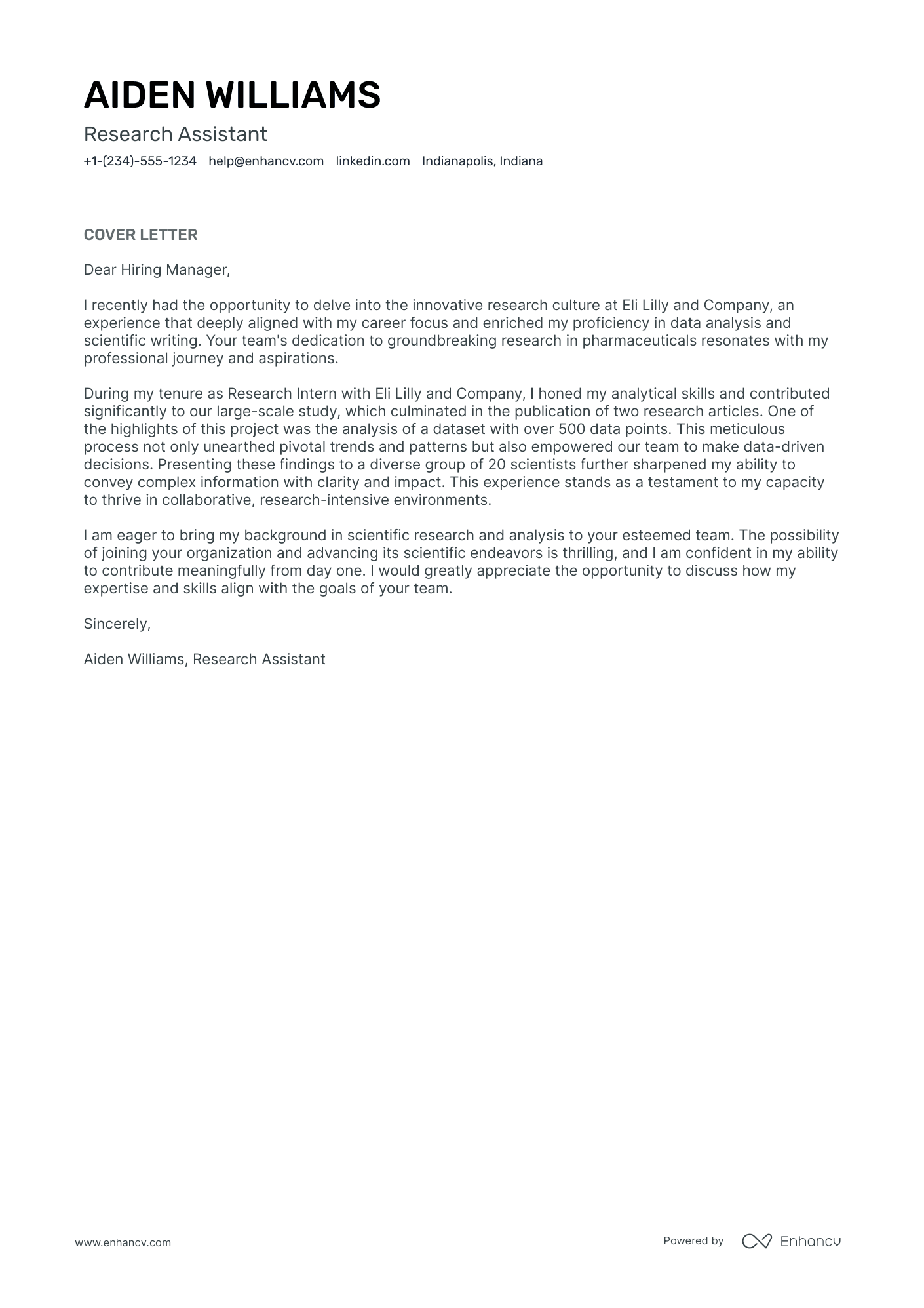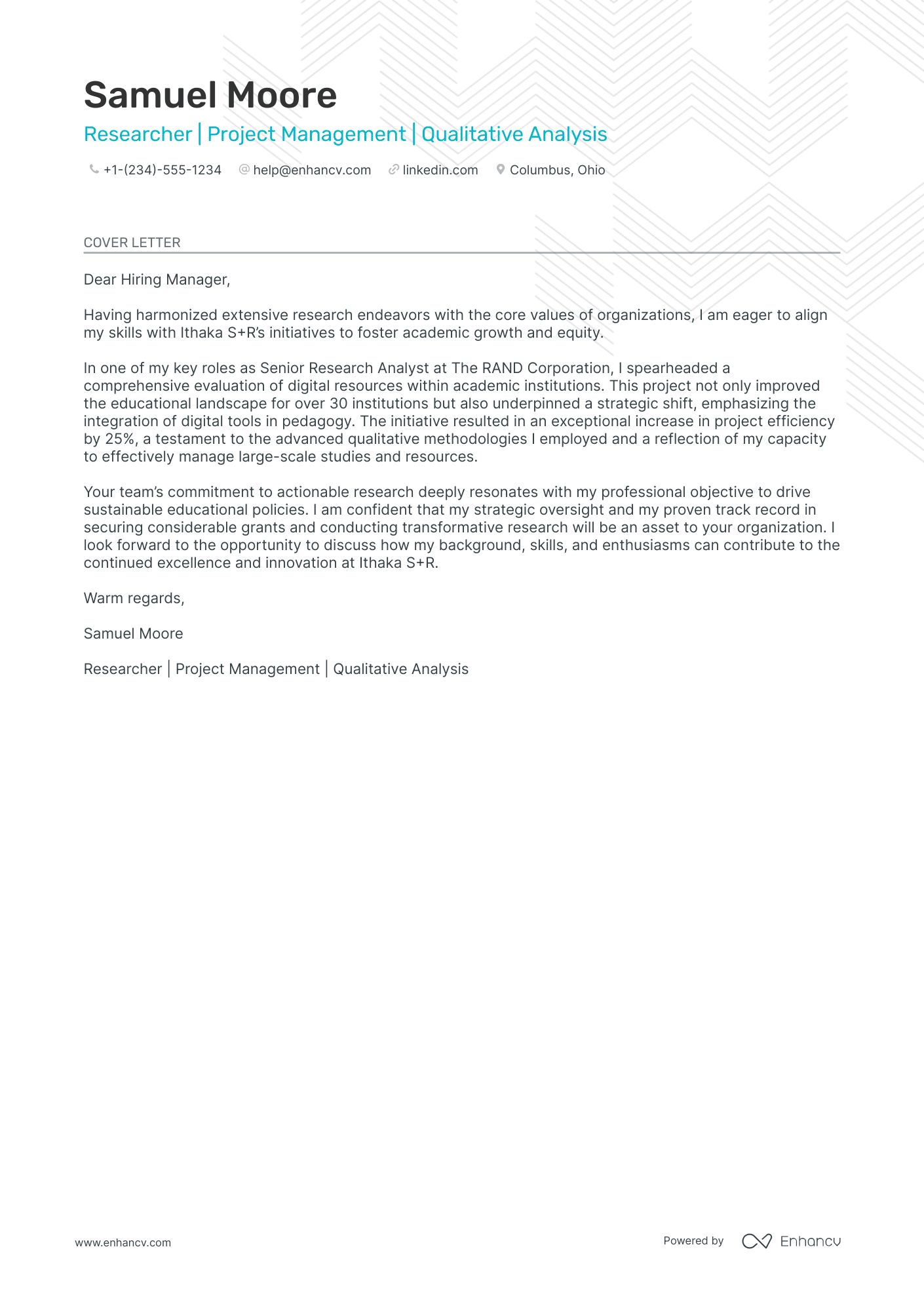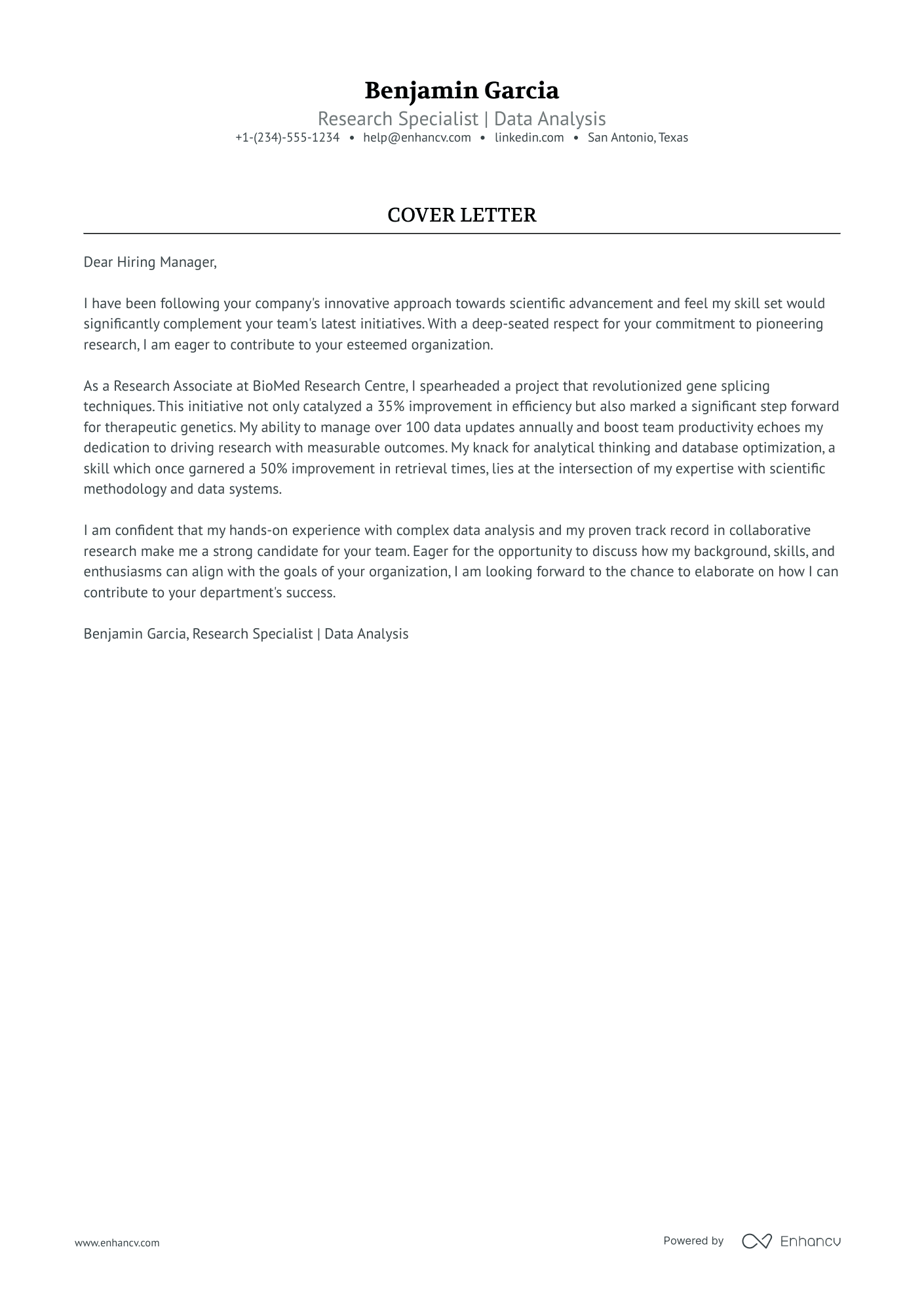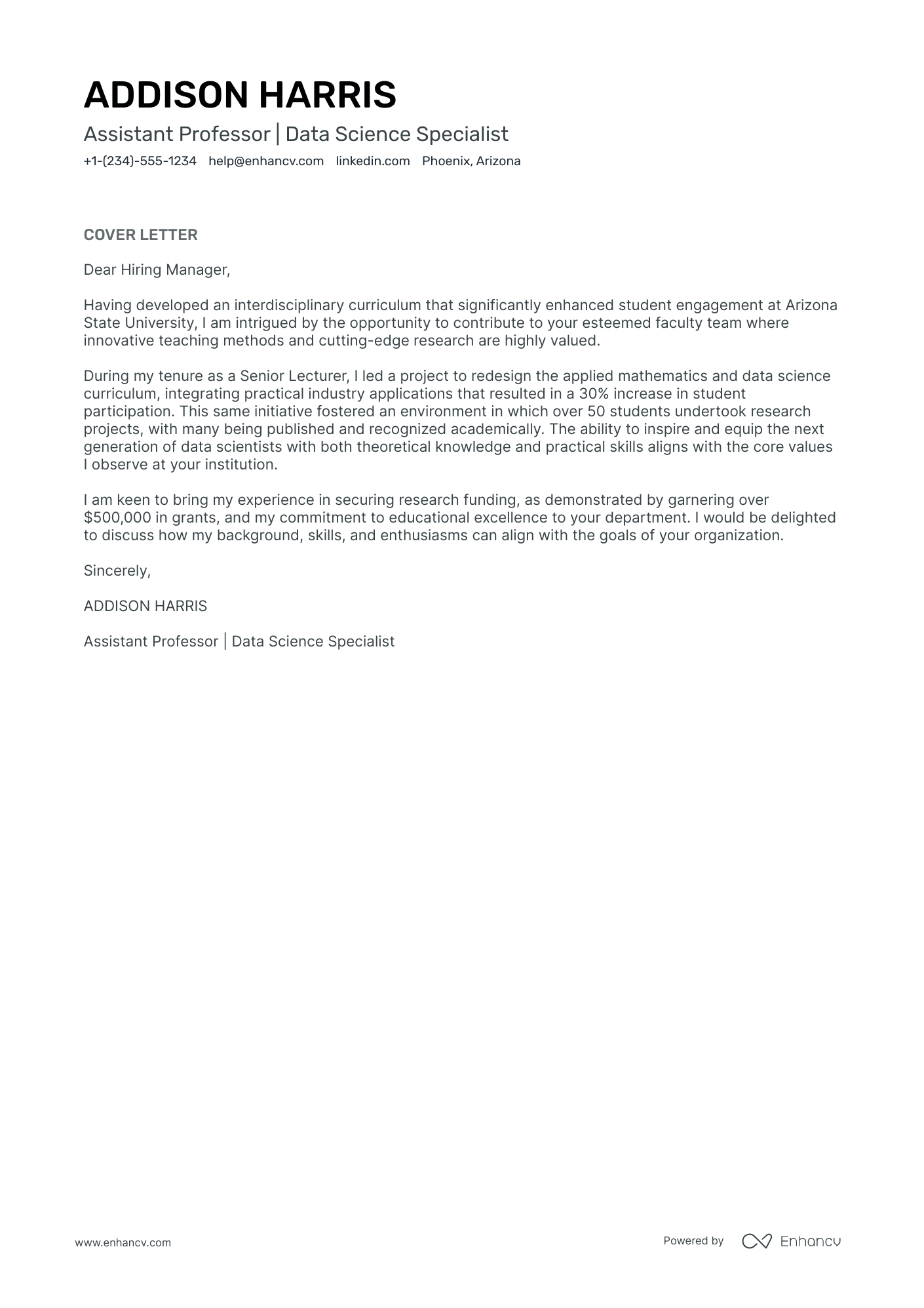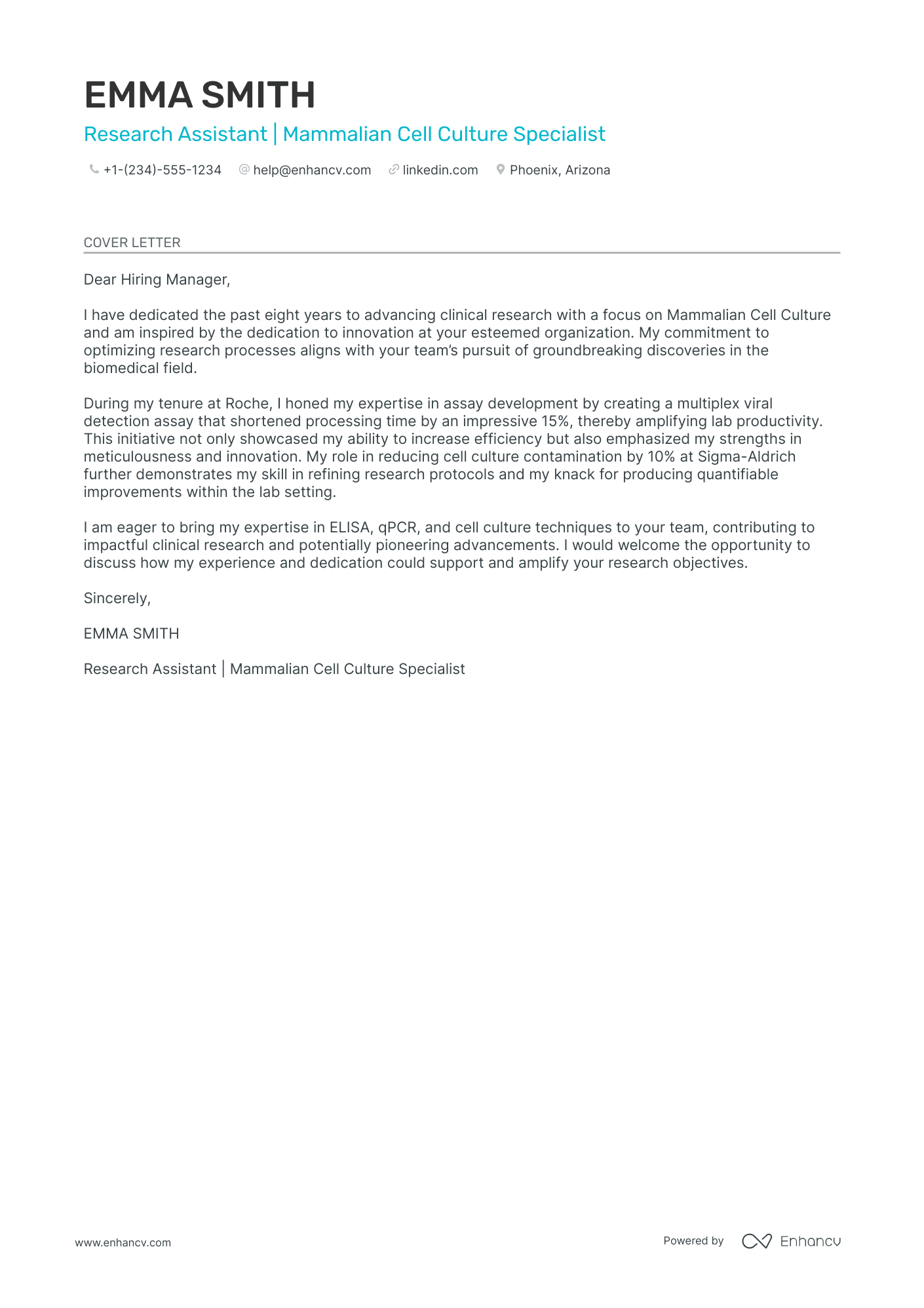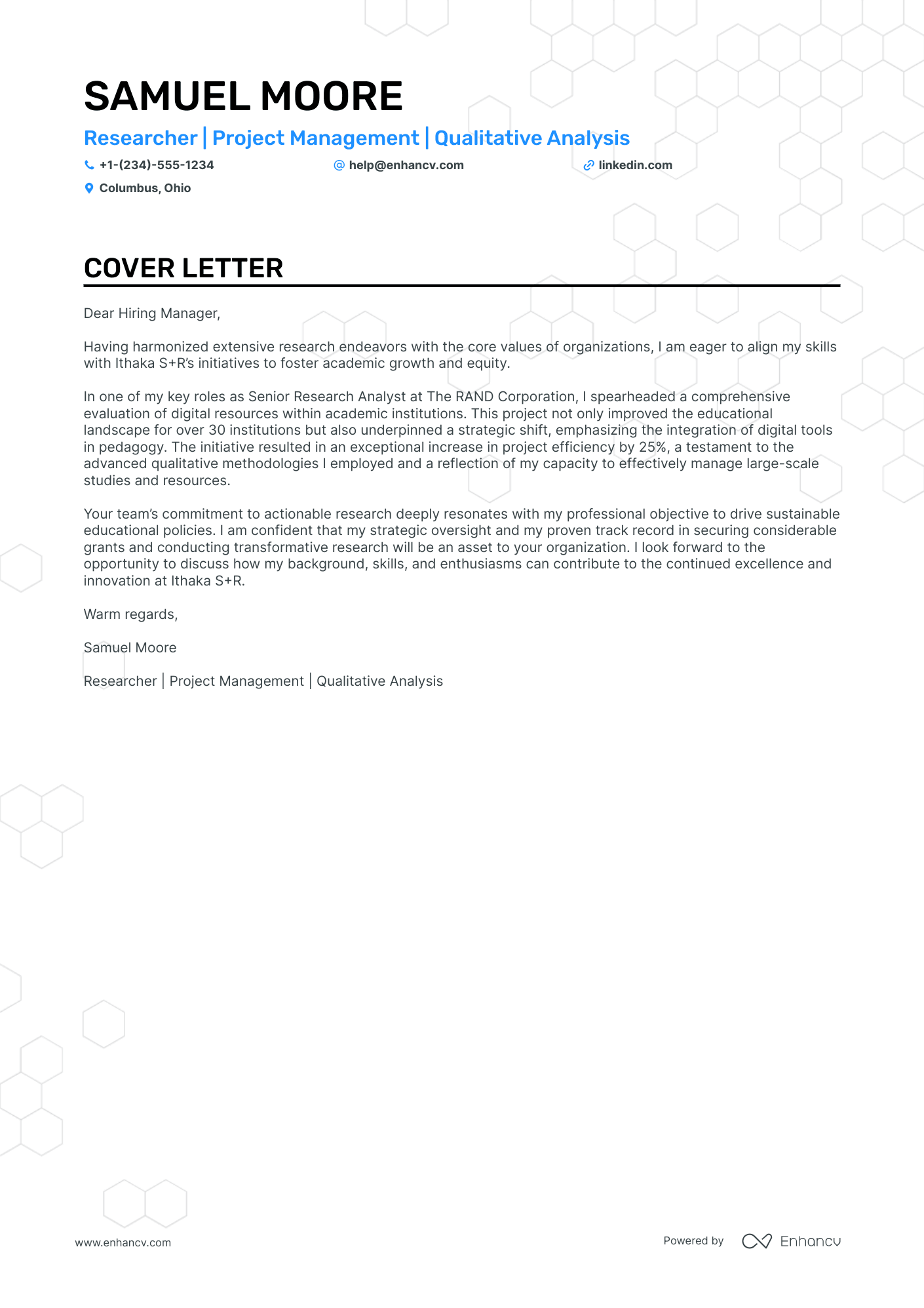Embarking on the quest for a research assistant role, you've likely encountered the pivotal step of crafting a compelling cover letter. It's not just about parroting your resume; your cover letter should weave a narrative around a standout professional triumph, capturing the essence of your expertise without resorting to overused clichés. Remember, keeping it concise within a single page is key. Let's navigate these waters together, ensuring your cover letter showcases your achievements with clarity and impact.
- Introduce your profile to catch recruiters' attention;
- Use professional templates and examples to make sure your research assistant cover letter follows the best industry standards;
- Settle on your most story-worthy achievement to shine a light on what makes your application unique;
- Write a research assistant cover letter, even when you lack professional experience.
Ready to start with the basics: upload your resume to Enhancv's AI, below, to see the research assistant cover letter it would write for you.
If the research assistant isn't exactly the one you're looking for we have a plethora of cover letter examples for jobs like this one:
- Research Assistant resume guide and example
- Entry Level Chemist cover letter example
- Quantitative Researcher cover letter example
- Quality Control Chemist cover letter example
- Chemist cover letter example
- Researcher cover letter example
- Student Researcher cover letter example
- Scientist cover letter example
- Biology cover letter example
Drop your resume here or choose a file.
PDF & DOCX only. Max 2MB file size.
Research assistant cover letter example
ISABELLA ADAMS
New York City, New York
+1-(234)-555-1234
help@enhancv.com
- Tailoring Experience to the Job Role: Mentioning the achievement of increasing efficiency in data collection processes for clinical trials directly relates to a key function of a Research Coordinator, thereby emphasizing relevant experience.
- Demonstrating Quantifiable Achievements: The cover letter highlights a specific metric of success – a 25% increase in efficiency – which demonstrates the candidate's ability to deliver measurable results.
- Attention to Data Privacy and Integrity: Research Coordinators must ensure the highest standards of data management. The applicant underscores her commitment to this aspect by citing past experience in maintaining data privacy and integrity.
- Proactive Problem Solving: The applicant describes how she proactively coordinated with research teams to improve operations, showcasing her problem-solving skills and initiative – qualities that are highly valued for a Research Coordinator position.
What about your research assistant cover letter format: organizing and structuring your information
Here is one secret you should know about your research assistant cover letter assessment. The Applicant Tracker System (or ATS) won't analyze your cover letter.
You should thus focus on making an excellent impression on recruiters by writing consistent:
- Header
- Greeting
- Introduction
- Body paragraphs (and explanation)
- Promise or Call to action
- Signature (that's optional)
Now, let's talk about the design of your research assistant cover letter.
Ensure all of your paragraphs are single-spaced and have a one-inch margins on all sides (like in our cover letter templates).
Also, our cover letter builder automatically takes care of the format and comes along with some of the most popular (and modern) fonts like Volkhov, Chivo, and Bitter.
Speaking of fonts, professionals advise you to keep your research assistant cover letter and resume in the same typography and avoid the over-used Arial or Times New Roman.
When wondering whether you should submit your research assistant cover letter in Doc or PDF, select the second, as PDF keeps all of your information and design consistent.
Cut down the time spent on cover letters. Use our free cover letter generator to create one in seconds.
The top sections on a research assistant cover letter
- Header: Include your name, contact information, and the date to ensure the recruiter knows who you are and how to reach you, which establishes professionalism and attention to detail.
- Greeting: Address the hiring manager or lead researcher by name if possible to personalize your cover letter and immediately demonstrate your commitment to building professional relationships.
- Introduction: Open with a clear statement about your interest in the research assistant role and your relevant educational background, which is critical in showing your enthusiasm and foundation for the position.
- Body: Elaborate on your research experience, technical skills, and any relevant coursework or projects, emphasizing how these uniquely qualify you for the research assistant position and demonstrate your ability to contribute meaningfully to the research team.
- Closing: Affirm your interest in the role and suggest an in-person or virtual meeting to discuss how you can contribute to their ongoing research projects, showing initiative and eagerness to engage further with the team.
Key qualities recruiters search for in a candidate’s cover letter
- Attention to Detail: Essential for ensuring accuracy in data collection, analysis, and reporting findings in research.
- Analytical Skills: Important for interpreting data, identifying patterns, and contributing to research outcomes.
- Technical Proficiency: Ability to use various research tools and software pertinent to the field of study.
- Relevant Research Experience: Previous involvement in research projects or familiarity with the subject matter shows readiness to contribute effectively.
- Strong Writing Abilities: Necessary for drafting research proposals, reports, and publications.
- Time Management: Capability to handle multiple tasks, meet deadlines, and manage the research timeline efficiently.
Kick off your research assistant cover letter: the salutation or greeting
When writing your research assistant cover letter, remember that you're not writing for some complex AI or robot, but for actual human beings.
And recruiters, while on the lookout to understand your experience, would enjoy seeing a cover letter that is tailored to the role and addresses them. Personally.
So, if you haven't done so, invest some time in finding out who's the hiring manager for the role you're applying to. A good place to start would be LinkedIn and the corporate website.
Alternatively, you could also get in touch with the company to find out more information about the role and the name of the recruiter.
If you haven't met the hiring manager, yet, your research assistant cover letter salutation should be on a last-name basis (e.g. "Dear Mr. Donaldson" or "Dear Ms. Estephan").
A good old, "Dear HR Professional" (or something along those lines) could work as your last resort if you're struggling to find out the recruiter's name.
List of salutations you can use
- Dear Hiring Manager,
- Dear [Name of the Principal Investigator or Supervisor],
- Dear [Research Department Head],
- Dear Dr. [Last Name],
- Dear Professor [Last Name],
- Dear Search Committee,
First introductions in your research assistant cover letter
Within your research assistant cover letter introduction, genuinely state what you like about the organization.
Research the latest company projects, honorary awards, company updates, etc.
Write up to two sentences to let recruiters know what impresses you about the company,
This would help you to set a good tone for the rest of the communication.
Storytelling in the middle (or body) of your research assistant cover letter
You've got your whole resume sorted, detailing your achievements and skills. What else can you write in your research assistant cover letter?
For starters, take the time to re-assess the job requirements and re-discover the most crucial skills and requirements (or keywords).
After making a list of these important keywords, look back on your experience to select just one of your past accomplishments.
Choose the achievement that is the most noteworthy, relevant to the role, and matches the required skills.
Use the next between three and six paragraphs to narrate how:
- you've grown your skill set, thanks to your achievement;
- you'd use the know-how you've gained in your new role;
- your accomplishment could help your potential employers grow.
Remember that recruiters don't need a retelling of your whole resume, but want to find out what makes you, you.
Ending your research assistant cover letter: a closing paragraph with a promise
If you're thinking of finishing your research assistant cover letter with a "Sincerely yours" or "Thanks for the consideration," you need to read on.
End the final paragraph of your research assistant cover letter with a twist:
- a promise - of how you'd grow as a professional, part of the company, or improve organizational metrics;
- a call to action - prompt interviewers with some follow-up actions if they are interested in your profile.
A personalized ending would surely help you to stand out by being a memorable candidate.
Keep this in mind when writing your zero experience research assistant cover letter
Even though you may not have any professional experience, your research assistant cover letter should focus on your value.
As a candidate for the particular role, what sort of skills do you bring about? Perhaps you're an apt leader and communicator, or have the ability to analyze situations from different perspectives.
Select one key achievement from your life, outside work, and narrate a story that sells your abilities in the best light.
If you really can't think of any relevant success, you could also paint the picture of how you see your professional future developing in the next five years, as part of the company.
Key takeaways
Writing your research assistant cover letter has never been easier, so remember to:
- Select a research assistant cover letter template that automatically meets industry formatting (e.g. has one-inch margins, is single-spaced, is in PDF, etc.);
- Make your research assistant cover letter personal by mentioning the recruiters' first or last name;
- Within the introduction, describe what you like best about the company in no more than two sentences;
- Use your research assistant cover letter body to tell a story of your greatest achievement, backed up by job-relevant skills and technologies;
- If you have no professional experience, be honest about it in your research assistant cover letter, but also write about your unique talents.
Research Assistant cover letter examples
By Experience
Entry-Level Research Assistant
By Role
